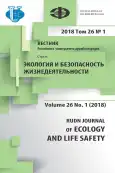ABOUT ENSURING OF ECOLOGICAL SAFETY IN MINE-EXTRACTIVE REGIONS ON THE BASE OF NEGATIVE KARST PROCESSES MINIMIZATION
- 作者: Gayev A.Y.1, Kilin Y.A.2
-
隶属关系:
- Orenburg State University of Russia
- Perm State University, Institute of karstology and speleology in Russian geographical society
- 期: 卷 26, 编号 1 (2018)
- 页面: 35-51
- 栏目: Geoecology
- URL: https://journal-vniispk.ru/2313-2310/article/view/342036
- DOI: https://doi.org/10.22363/2313-2310-2018-26-1-35-51
- ID: 342036
如何引用文章
全文:
详细
Long investigations were fulfilled by authors in the region of Urals where ecological dangerous negative geodynamical karst processes are wide spread, because 40% of territory consists of limestone, dolomites, marls, gypsum, anhydride and stone salt. The solution of them by surfaceand underground water form the karst landscape with formation of surface and underground shapes - karst depressions, hollows, craters, ravines, caves, etc. This formation occurs lengthwise of neotectonical disturbances and relaxed zones of earth crust, which have been forming hereditary and with positive sign. They expose and hydrogeologicaly activate fissure and cave systems forming the zones of karst water accumulation which may be large water reservoirs and simultaneously the places of high ecological danger for population and engineering infrastructure. These dangerous processes retard social economical development of territories. For its minimization and out of dangerous work of even so complicated construction as transcontinental gas pipe we suggest the methods of investigations and forecast and minimization of consequences of dangerous processes including the systems of monitoring and operate following the transformation of blocks of karsting rocks and technique conditions of constructions and communications. It’s necessary to pay special attention on such neolandscape elements as troughs of settling-collapse which are the cause of the most ecologically dangerous negative geodynamical processes. All attention today is focused on depressional forms of karst which is supposed to be the main danger for crossing of them communications. On the boards of karst depressions near the watershed part of landscape profile the steep plots occur which is conditioned by disjunctive dislocations in connection with more energetic neotectonical raisings. The degree of danger is recommended to determine according the complex of methods including hydrogeochemical, using the parameter - relative module of underground chemical denudation in t/km2 on 1m. Technical monitoring was firstlycarried out in 1994-95 on karst dangerous plots, it consists of systematic measuring of tense condition of pipe metal. We established the regular intercommunication of deformations in rock massifs and in pipe metal. It contribute to timely realization of prophylactic measures for prevention of ecologically dangerous negative geodynamic processes.
作者简介
Arkadij Gayev
Orenburg State University of Russia
编辑信件的主要联系方式.
Email: gayev@mail.ru
Doctor of Geological and Mineralogical Sciences, Professor. Academician of the International Academy of Ecology, Man and Nature Protection Sciences, Academician of the RAEN. Professor in the Orenburg State University, Professor in the Perm State University. Director of the Institute of Ecological Problems of the Hydrosphere at the Orenburg State University. Chef redactor of the editor-in-chief of interuniversity collection “Hydrogeology and karst studies”.
13, Pobeda ave., Orenburg, 460018, Russian FederationYurij Kilin
Perm State University, Institute of karstology and speleology in Russian geographical society
Email: yuakilin@mail.ru
candidate of of Geological and Mineralogical Sciences, associate professor at the Department of dynamic Geology and hydrogeology of Perm State University. Deputy Director, Institute of karstology and speleology in Russian geographical society, Perm state University
15, Bukireva str., Perm’, 614990, Russian Federation参考
- Vernadsky V.I. History of natural water. M.: Nauka, 2003. 751 p.
- Vernadsky V.I. Biosphere. M.: Mysl, 1967. 367 p.
- The fundamentals of hydrogeology. V. 1: General hydrogeology / E.V. Pinneker, B.I. Pisarsky, S.L. Shvartsev, etc. Novosibirsk: Nauka, 1980. 232 p.; V. 6: Utilization and protection of ground water / Edited by N.A. Marinov, E.V. Pinneker. Novosibirsk: Nauka, 1983. 230 p.
- Ecological bases of water management (on the example of the Orenburg region and adjacent areas): monograph / A.Ya. Gaev, I.N. Alferov, V.G. Gackov et al. Perm: Perm Univ., 2007. 327 p.
- Gayev A.Ya. Hydrogeochemistry of Urals and problems of ground water protection. Sverdlovsk: Publ. h. of Ural un., 1989. 368 p.
- Kilin Yu.A. Estimation of hydrogeological conditions during the development of karst territories on the example of north part of Ufa plateau. Autosammary of dis. of cand. Geol.-min. sc. Perm un. Perm, 2003. 23 p.
- Maximovich G.A. Fundamentals of karstology: Manual. V. 1. Perm: Perm publ. h., 1963. 444 p.; 1969. V. 2. 529 p.
- Gorbunova K.A., Andreychuk V.N., Kostarev V.P., Maximovich N.G. Karst and caves of Perm oblast. Perm: Publ. h. of Perm un., 1992. 200 p.
- Maksimovich G.A., Gorbunova K.A. Karst of the Perm region. Perm: Perm. publishing house, 1958. 529 p.
- Andreychuk V.N. Technogenous karstogenes in mine-extracting regions. Autosummary of dis. d.g.-m. sc. Ekaterinburg, 1995. 46 p.
- Gaev A.Ya., Kilin Yu.A., Chichelov V.A., Khasanov R.N. Karst processes in the areas of the Urals // Gas industry. 1998. No. 3. P. 28.
- Hydrogeology of the USSR. M.: Nedra, 1970. V. 13. 800 p.; 1972. V. 14. 648 p.; 1972. V. 15. 344 p.; 1972. V. 43. 272 p.; 1973. Consolidated volume. Issue 4. 278 p.
- Katayev V.N. Theory and methodology of structure-tectonical analysis in karstology. Autosummary dis. d. g.-m. sc. Perm, 1999. 45 p.
- Lukin A.V., Yezhov Yu.A. Large-scale engineer-geological division into districts of territory v. Krasny Yasyl in Perm oblast // Karst of nechernozemie: Thes. rep. Perm, 1980.
- Manual to engineer-geological research in karst regions // Edited by I.A. Savarensky, N.A. Mironov. M.: PNIIIS of Minstroy of Russia, 1995.
- Sofronitsky P.A. East part of Russian platform // Geology of USSR. M.: Nedra, 1969. V. 12. P. 1.
- Ikonnikov E.A. Conditions of karst development in north part of Yuryusan-Sylva depression // Hydrogeology and karstology. Issue 6. Perm. 1975. P. 51—55.
- Shimanovsky L.A., Shimanovskaya I.A. Fresh ground water of Perm oblast.
补充文件









